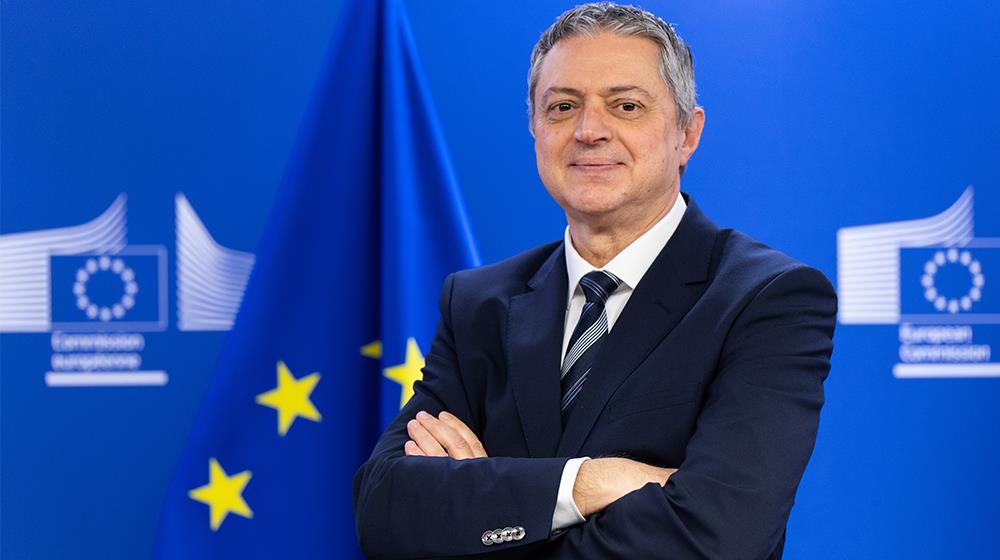"The translation industry has always thrived as an early adopter of state-of-the-art technologies, functioning in a highly digitalised environment. My staff here in DGT has been using AI-based technology since 2017," Christos Ellinides, the Director-General of the European Commission’s Directorate General for Translation (DGT) has revealed.
In an interview with CBN, Ellinides, one of a small number of Cypriots to rise to the position of Director-General at the European Commission, also underlined, among other things, how central and essential DGT’s translation service is to the Commission’s legislative and political activities. “In fact," he elaborated, "to adopt a piece of legislation or policy, the Commission must publish these in all 24 EU official languages. In this way, DGT has a fundamental role in the functioning of the Commission and of all the EU institutions, since it enables the EU’s multilingual decision-making process and communication with the wider public.”
You have held a number of significant positions at the European Commission for over 17 years. Can you tell us more about your current role as Director General at the Directorate General for Translation (DGT)?
I have been in the post of Director-General in the Directorate General for Translation (DGT) since March 2022 and also Chairman of the Management Board of the Translation Centre for the Bodies of the EU, an EU Agency based in Luxembourg.
My main responsibility is to ensure the timely, quality, and cost-efficient translation and language services to the European Commission, other European institutions, and EU member states. I am managing an organisation, of 2000 professional staff located in Luxembourg and Brussels, that is considered to be a world leading service, and point of reference in institutional translation.
DGT’s translation service is central and essential to the Commission’s legislative and political activities. In fact, to adopt a piece of legislation or policy, the Commission must publish these in all 24 EU official languages. In this way, DGT has a fundamental role in the functioning of the Commission and of all the EU institutions, since it enables the EU’s multilingual decision-making process and communication with the wider public.
Nowadays there is a need to communicate even more with citizens in their languages to reinforce and defend the EU democratic values. Corporate services, including translation, multi-lingual web communication, but also editing and clear writing will have to continue to operate against a background of technological developments and a constantly evolving professional paradigm.
Along these lines, DGT is also leading a network of Universities that offer academic qualifications in this area. I am chairing the Board of the European Master’s in Translation (EMT) network which counts about 70 members throughout Europe. It is a network of Master’s programmes that aim to improve the quality of translator training and enhance the labour market integration of young language professionals. By cooperating closely with the language industry, the EMT network ensures that academic translator training meets the real needs of the profession.
A lot of your work at the European Commission has been directly linked to technology, a sector which is known for constantly evolving. What role does technology play at the DGT and how do you anticipate this role to develop in the future, taking into account new technology such as AI?
The translation industry has always thrived as an early adopter of state-of-the-art technologies, functioning in a highly digitalised environment. My staff here in DGT has been using AI-based technology since 2017. We have developed our own machine translation system, “eTranslation”, based on neural technology and have been implementing AI-coding for the last few years. This system is widely used, not only within EU institutions but also by public administrations and universities in member states, by SMEs, NGOs, and other entities that use our AI-based services under the Digital Europe Program (DEP). Last year alone we processed almost 200 million pages through eTranslation.
The latest wave of AI technology represented by the new generation of large language models (LLMs) has brought unprecedented general-purpose capabilities. Generative AI represents not just an incremental improvement of existing AI technologies, but a leap that fundamentally changes the areas of application for AI as well as the potential risks.
The European Commission is committed as a leader in trustworthy AI-based systems and our President, Ursula von der Leyen, is keen in securing EU’s technological sovereignty and competitive edge in the global geopolitical arena.
DGT has a central role in the deployment of AI-powered language services in the Commission and beyond, in close cooperation with DG CNECT’s CEF and DEP programmes. Besides eTranslation, we have developed and delivered AI-powered services like speech-to-text transcription, text summarisation services, natural language processing tools, production of electronic briefings etc. by exploring the opportunities brought by AI in a pragmatic, user-centric way. Our latest service (as of last month) is a Web-based free plugin to Europeans through which they can exploit the power of multilingual translation, seamlessly integrating websites and breaking language barriers by displaying their websites in any EU language, expanding global audience, and benefiting by offering products, services etc in a multilingual digital single market.
DGT is also exploring the possibilities of high-performance computing through the EuroHPC Joint Venture, completing a project aimed at improving machine translation quality. At the same time, a proof-of-concept for the training of an institutional EU LLM at the Luxembourg supercomputer facility is ongoing, which could have a major effect on the design and implementation of more AI-powered language services built on EU own, safe, and secure language models. We are targeting a multilingual EU LLM made in the EU, for the EU, and compliant with the EU AI Act.
Making available safe, lawful and trustworthy AI in the EU can significantly contribute to the EU’s technological sovereignty and help to prevent an AI divide between those with access to advanced AI systems and those without.
You are one of only a small number of Cypriots that has held such a high position at the European Commission. What do consider to have been some of the high points (so far!) and what professional legacy would you like to leave behind one day?
Throughout my career in the Commission, I have enjoyed an extremely motivating and professional environment that allowed me to contribute in a qualitative but also quantitative manner to the strategic objectives of the Commission.
Initially as a Director in the Directorate General responsible for technology (DIGIT) I strived to provide the European Commission, and whenever pertinent other European institutions and Member States, with solutions based on innovative technologies and support services. I would like to believe that my technological expertise has contributed to the development and streamlining of several IT systems and services. Specifically in the areas of e-Government, collaborative tools, web technologies, network, and telecommunication infrastructure.
Lately, my involvement in shaping and implementing services exploiting AI and language technologies has been an extraordinary experience. I believe there is still a lot we can do. I am convinced that together with my teams here in DGT we will leave our mark in moving forward with these advanced cutting-edge technologies.
On a lighter note, having worked away from Cyprus for so many years, is there anything you still particularly miss from the island?
Simply put - family and friends, the Cypriot cuisine and of course the sun!








